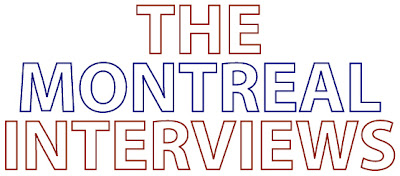The Montreal Interviews: Emma Tibaldo
While our “10 questions” interview series is on its year-end hiatus, we are pleased to present a short interview series by Praxis Theatre Associate Artist Greta Papageorgiu: The Montreal Interviews. Enjoy!

 1) What does Montreal mean to you?
1) What does Montreal mean to you?
It’s the place I grew up. It gave me a cultural identity and a view of the world that lives outside the mainstream. I see life as vulgar and beautiful. Full and empty. Exciting and horribly dull. I see the summer and the winter, the warm and the cold. All this comes from this city that embraces you with open arms and shuts you out when it feels like doing so.
2) As one of the first graduates of the National Theatre School’s directing program, how do you feel about the experience?
The program had been dormant since the mid nineties. As such, this new program was open to us as its co-creators. We had quite a say in how the program was structured and also had to navigate the territory of uncharted pedagogical terrain. It was great, exciting, at times frustrating but always challenging. I am forever thankful for the people I have met.
3) What is Playwrights’ Workshop Montreal?
It is a national new play development organization for the Canadian stage. We are a member-based organization that works with playwrights from across the country to ready new scripts for our stages. We work with emerging playwrights as well as established playwrights with programs like workshop readings, public readings, one-on-one dramaturgy, masterclass, playwright units, residencies (including Tadoussac) and production dramaturgy. We also work with theatres to disseminate the work.
4) As its new Artistic Director, what new initiatives are you hoping to bring to the company?
I’m working towards a creative centre that will allow us to push the boundaries of dramaturgy further into the multidisciplinary. We need to allow our playwrights to work with designers and other artists much earlier in the development process. I’d also like to have a much longer developmental relationship with new theatrical projects.
5) What play have you most enjoyed directing?
I’ve been fortunate enough to direct plays I really love so each has been my favourite. In terms of visual excitement I’d have to say Lifedream by Hérmenigilde Chiasson.
6) What do think is the most important thing Canadian theatre artists should be working on right now?
Metaphor and big ideas: The things the stage does best.
7) In a recent article in the Mirror you commented on the lack of works by female playwrights. Why do think that is and what should we be doing to fix the situation?
We need to be exposed to the work by women so that we grow to demand works by women. We are very conditioned by the male point of view. It is what we crave because it is what we know. We need to open our minds to the way women express their views of the world. These views are just as interesting and as profound as those expressed by men but like any artistic movement we have to be exposed to it to appreciate it. So, get the educational institutions to expand female representation in literary and drama courses. We all love Jane Austen because we all know Jane Austen, we have an appreciation for her work. Let’s raise that awareness for a multitude of other female writers. Women are just as exciting and experimental as men, really! Demand that Theatres produce more work by women and go out to see that work. Support it!
8) What do you think is unique about the Anglophone theatre community in Montreal?
Ummmm. People who live here come because they want to experience Quebecois culture. The city has two big theatrical institutions, National Theatre School and Concordia, so theatre artists come here to study and then leave to go back home or head for the big lights. The theatre community that remains struggles to find space, money and an audience. I don’t want to paint a gloomy picture because there are quite a few vibrant companies but it is a struggle. French theatre, on the other hand, has a great pool of talent, the most inventive artists work in this city, they have the structures to nurture their work if not the money. It is a great city because of the influence movement-based Quebecois theatre has on us as English language theatre artists.
9) As a director what is the strangest thing an actor has done during an audition?
Gosh, I’ve only worked with stable, committed actors.
10) If you had a $100,000 no-strings-attached production budget, what would you do with it?
Put up two plays by Montréal women playwrights.


Recent Comments